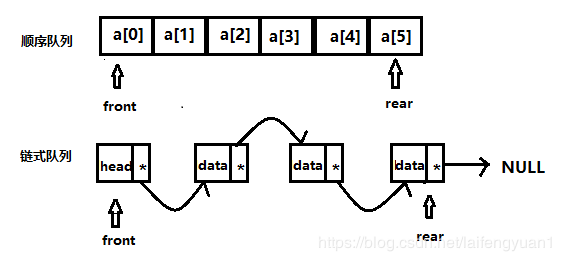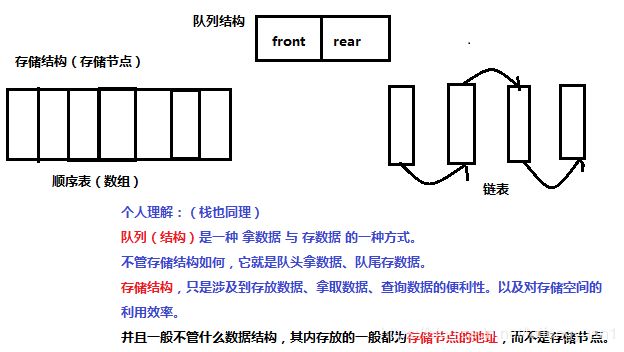数据结构:队列的实现
目录
一、队列
二、顺序队列的实现
三、链式队列的实现
一、队列
队列是一种特殊的线性表,特殊之处在于它只允许在表的前端(front)进行删除操作,而在表的后端(rear)进行插入操作,和栈一样,队列是一种操作受限制的线性表。进行插入操作的端称为队尾,进行删除操作的端称为队头。队列中没有元素时,称为空队列。
队列所需要的功能:
- 初始化
- 入队
- 出队
- 判断队列是否为空(队列是否为满)
- 遍历栈
- 清空队列与销毁队列
队列的分类:
- 顺序队列:核心存储结构为数组,为连续空间。
- 链式队列:核心存储结构为链表,为碎片空间。
- 个人对数据结构的一点理解
二、顺序队列的实现
- 栈的定义
#define SIZE 10
typedef struct squeue
{
int *data;
int front;
int rear;
}sq,*sq_p;
- 初始化
/*队列初始化*/
sq_p init_squeue()
{
sq_p squeue = malloc(sizeof(sq));
if(squeue != NULL)
{
squeue->data = calloc(SIZE,sizeof(int));
squeue->front = squeue->rear = 0;
}
return squeue;
}- 判断是否为空队(判断是否为满队)
/*判断队列是否满*/
bool isFull(sq_p squeue)
{
return squeue->front == (squeue->rear +1)%SIZE;
}
/*判断队列是否空*/
bool isEmpty(sq_p squeue)
{
return squeue->front == squeue->rear;
}- 入队
/*
入队:在rear(尾部插入)
*/
bool in_sq(int data, sq_p squeue)
{
//判断队列是否满了
if (isFull(squeue))
{
printf("squeue is full of data\n");
return false;
}
//入队
squeue->data[squeue->rear] = data;
squeue->rear = (squeue->rear + 1)%SIZE;//循环队列
return true;
}- 出队
/*
出队:在front(队头删除)
*/
bool out_sq(int *data,sq_p squeue)
{
//判断对了是否为空
if (isEmpty(squeue))
{
printf("squeue is empty\n");
return false;
}
//出队
*data = squeue->data[squeue->front];
squeue->front = (squeue->front + 1)%SIZE;
r- 遍历队列
/*遍历打印队列中数据*/
void showSqueue(sq_p squeue)
{
if (isEmpty(squeue))
{
printf("squeue is empty\n");
return;
}
//队头位置
int pos = squeue->front;
//遍历栈中元素
while(pos != squeue->rear)
{
printf("%d\t", squeue->data[pos]);
pos = (pos+1)%SIZE;
}
}- 清空队列 与 销毁队列
/*清空队列中数据*/
void clearSqueue(sq_p squeue)
{
if (isEmpty(squeue))
{
printf("squeue is empty\n");
return;
}
int data;
//清空队列中数据
while(!isEmpty(squeue))
{
out_sq(&data,squeue);
}
}
/*销毁队列*/
void destroySqueue(sq_p squeue)
{
free(squeue->data);
free(squeue);
}三、链式队列的实现
- 链式队列的定义
/*队列存储节点*/
typedef struct node
{
int data;
struct node *next;
}sqNode, *sqNode_p;
/*队列的队头与队尾*/
typedef struct squeue
{
sqNode_p front;
sqNode_p rear;
}sqLink, *sqLink_p;- 初始化
/*队列初始化,包含创建存储节点的头节点*/
sqLink_p init_squeue()
{
sqLink_p squeue = malloc(sizeof(sqLink));
if (squeue != NULL)
{
//队头、队尾指向头结点
squeue->front = squeue->rear = malloc(sizeof(sqNode));
squeue->rear->next = NULL;//头结点的下一个节点指向NULL
return squeue;
}
}- 判断队列是否为空
/*判断队列是否为空*/
bool isEmpty(sqLink_p squeue)
{
return squeue->front == squeue->rear;
}
- 入队
/*入队*/
bool in_sq(int data ,sqLink_p squeue)
{
sqNode_p new = malloc(sizeof(sqNode));
if(new != NULL)
{
new->data = data;//链式结构:都优先处理新节点
new->next = NULL;
squeue->rear->next = new;
squeue->rear = new;
return true;
}
else return false;
}- 出队
/*出队*/
bool out_sq(int *data, sqLink_p squeue)
{
//判断队列是否为空
if(isEmpty(squeue))
{
printf("squeue is empty\n");
return false;
}
//squeue->front 一直指向头节点, 出队操作完成后需要更新 队尾
sqNode_p p = squeue->front->next;//获得第一个节点
*data = p->data;//保存数据
squeue->front->next = p->next;//更新头节点
if(p->next == NULL) //只有一个节点的情况
{
squeue->rear = squeue->front;
}
free(p);
return true;
}- 遍历、显示队列
/*遍历队列*/
void showSqueue(sqLink_p squeue)
{
//判断队列是否为空
if (isEmpty(squeue))
{
printf("squeue is empty\n");
return;
}
sqNode_p p = squeue->front->next;//从第一个节点开始遍历
while(p != NULL)
{
printf("%d\t", p->data);
p = p->next;
}
printf("\n");
}- 清空队列 与 销毁队列
/*清空队列*/
void clearSqueue(sqLink_p squeue)
{
//判断队列是否为空
if (isEmpty(squeue))
{
printf("squeue is empty\n");
return;
}
sqNode_p p = squeue->front->next;
sqNode_p tmp;
squeue->rear = squeue->front;//更新队列front、rear指向
while(p != NULL)//清空数据
{
tmp = p->next;
free(p);
p = tmp;
}
printf("清空成功\n");
}
/*销毁队列*/
void destroySqueue(sqLink_p squeue)
{
//判断队列是否为空
if (isEmpty(squeue))
{
free(squeue);
return;
}
while(squeue->front != NULL)
{
squeue->rear = squeue->front->next;s
free(squeue->front);
squeue->front = squeue->rear;
}
printf("销毁成功\n");
}

